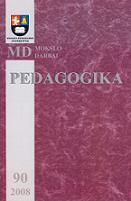Dialogas edukaciniame procese
Dialog in the Process of Education
Author(s): Juozas ŽilionisSubject(s): Education
Published by: Vytauto Didžiojo Universitetas
Keywords: dialog; process of education; reflection; intersubjectivity; asymmetric relations
Summary/Abstract: The conceptual methods of phenomenology are widely involved into the problematic field of contemporary pedagogy. In the process, which involves educator, pupil and the content of education, the representatives of phenomenology fix attention on the model of communication and underline the importance of dialogue. In didactic process, dialogue as if of its own accord shapes the meeting with other and the experienced limits of being and modifying. The conception of dialogue, based on the "being with" others, is one of the main philosophical issues. Theory of intentionality reduces the notion of dialogue not to the binary I-you relation, but to the triple relation between the members of dialogue and its subject. The subject, the content of the dialogue, is the condition of partnership in talking. Others in the dialogue are as acting together in all intentionality. However, thanks to the phenomenological reduction they do not lose their own peculiarities and recognize the peculiarity of others. The dialogical interaction of transmission and reception is extended, in the other words it is supplemented with intentional comprehension of the world. Thus the member of dialogue not only speaks to other member but also actively turns to him, but not as the separate ego but as already the other. The functioning of dialog specifically unfolds through the prism of speaking and thinking, sphere of social relations, arts and morality. In the contemporary education dialog, which stretches from the everyday trivialities up to the transcendental spirituality, reveals the uniqueness and autonomy of person. The meeting of I and You, highlighted in philosophy, expanded the limits of authentic being by revealing the common properties of I and other during the intersubjective constituting the identical world in the process of dialog. This expansion determines asymmetric relations in the dialog between educator and pupil. The universality of these relations unfolds in the fields of dialogical thinking and acting in verbal, graphic and mnemonic forms. These relations perform epistemological, informative, diagnostic, axiological, regulative, and transcendental functions.
Journal: Pedagogika
- Issue Year: 2008
- Issue No: 90
- Page Range: 7-11
- Page Count: 5
- Language: Lithuanian

